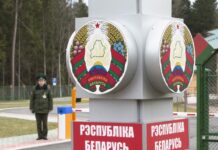
EU member countries faced with high migrant flows expect Lithuania to show solidarity in taking in arrivals, Prime Minister Ingrida Simonyte announced on April 18. Following approval by the European Parliament of the EU’s migration reform package, which requires Lithuania to accept around 158 migrants or pay 3.16 million euros annually, the debate on which path to take is heating up in the country.
“When we appealed to these countries for greater support for Ukraine and in dealing with some other important issues, including the instrumentalization of migration, we expected understanding. We have to understand that these countries expect understanding from us as well,” Simonyte told reporters. “If all countries choose to pay the money, these people can’t be left hanging in the air. We need to solve this problem somehow,” she added.
The prime minister believes that the debate on whether Lithuania should take in about 150 migrants every year or pay several million euros is artificial. “In my understanding, that dilemma doesn’t exist. We can certainly help other EU countries to take some pressure off, especially since the numbers (…) aren’t the ones we faced when migrants were coming across the border, pushed by (Alexander) Lukashenko,” she said, referring to the influx of irregular migrants from Belarus in 2021. Simonyte warned that the debate on the relocation of migrants overshadows the essence of the migration package.
“The Migration Pact is much more than just this issue, to which we for some reason narrow all that change down in public discussion. Because provisions have been adopted on completely different principles and a completely different approach to the migration process, including cases where migration is instrumentalized, which is what we faced,” she said. The migration package has yet to be approved by the EU Council.
Viktorija Cmilyte-Nielsen, speaker of the parliament and leader of the Liberal Movement, has also spoken out in favour of taking in migrants. Howhever, Irena Segaloviciene, President Gitanas Nauseda’s chief economic and social policy advisor, has said recently that out of the two options, the financial contribution “is more acceptable to the president”. Interior Minister Agne Bilotaite has said earlier that a commission made up of representatives from various ministries should decide on Lithuania’s actions.





























